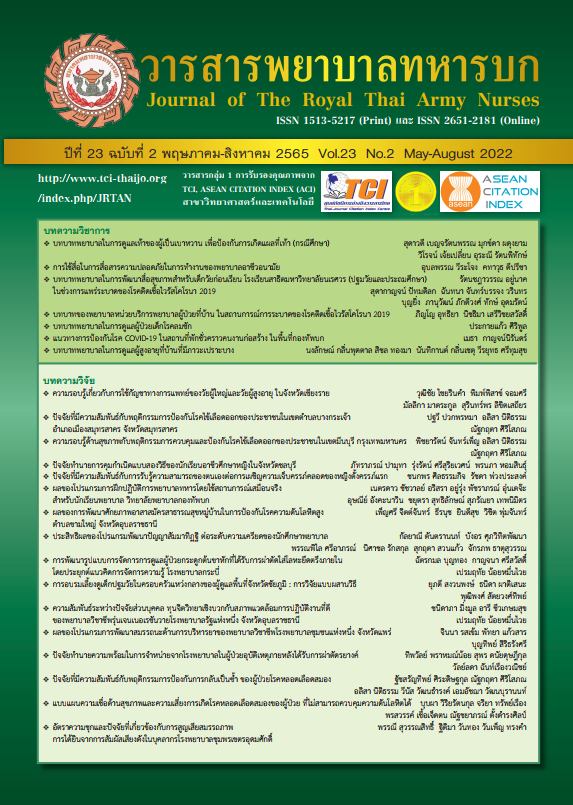Relationships between Personal Factors, Positive Psychological Capital, and Positive Practice Environment of Generation Y Professional Nurses at a Public Hospital, Ubon Ratchathani Province
Keywords:
Personal factors, Positive psychological capital, Positive Practice Environment, Professional nurse, Generation YAbstract
The purposes of this descriptive study were 1) to investigate personal factors, positive psychological capital, and the positive practice environment of Generation Y professional nurses at a Public Hospital, Ubon Ratchathani Province; and 2) to explore the correlation among their personal factors, positive psychological capital, and positive practice environment.The sample comprised 129 registered Generation Y aged nurses who worked at a public hospital in Ubon Ratchathani Province. They were selected by simple random sampling. Research tools comprised questionnaires with 3 parts including 1) personal factors, 2) positive psychological capital, and 3) positive practice environment. The tools were tested for content validity. The reliabilities of the second and the third sections were .92 and .96 respectively. Data were analyzed by descriptive statistics, and Spearman rank correlation coefficient.
The major findings were as follows. 1) Job duration of generation Y professional nurses was mostly 1-5 years (53.5%), and working hours per week was more than 48 hours (88.4%). Positive psychological capital was rated at the highest level (M = 4.59), and positive practice environment was rated at high level (M = 4.37). 2) Working hours per week and positive psychological capital were significantly and moderately positively related to positive practice environment at the level .001. However, job duration was not related to positive practice environment. The findings suggested that administrators should concern with Positive Practice Environment, Positive psychological capital, Working hours per week, Professional nurse, Generation Y. Performing tasks with good quality of work life this will bring good results to service recipients.
Downloads
References
World Health Professions Alliance. Stand up for Positive Practice Environments. World Health Professions Alliance.2020;1-2
Singhadong N.Positive Practice Environment Journal of Nurses Association of NorthEasternDivision. 2013; 31(3)6-12. (in Thai)
kirwan M,Mattews A,Scott P.A.The impact of the work environment of nurses on patient safety outcomes: A multi-level modelling approach. Journal of International Journal of Nursing Studies2013,50(2)253-263
Peter Van B, Christoph K, Susan Mace W, Danny Van H, 3, Sean P C.The relationshipbetween nurse practice environment, nurse workcharacteristics, burnout and job outcome and qualility nursing care : A cross-sectional survey. Journal of International Journal of Nursing Studies.2013; 50(12), 1667-1677
International Council of Nurse.Key Characteristics of Positive Practice Environments for Health Care Professionals.2012; 1-3
Lavoie-Tremblay M .The Needs and Expectations of Generation Y Nurse in the Workplace. Journal of Nurse in staff development. 2010; 1(1)2-8.
Pisitnuphong N.Work Environment That Are Related to The Organizationnal Engagement of Government Officers and Staff of Saimai District Bangkok.Journal of Business Administration and Socaial Sciences Ramkhamhaeg University. 2017; 1(1)64-78. (in Thai)
Rerkluenrit J, Kodchakr R. A Study of the Relationship between Selected Personal Factors, Professional Practice Environment and Job Satisfaction of Registered Nurses in. Thailand. Journal of Srinagarind Med J. 2019; 34(3) 287-292.(in Thai)
Thailand Nursing and Midwifery.Nursing Hours Policy for Patient Safety Nursing Council Ministry of Public Health.2017; 1-2. (in Thai)
Luthans F, Youssef CM, Avolio BJ. Psychological Capital and Beyond. Oxford University Press. 2015;45-143
Uthairangsee M. Psychological Capital and Work Engagement of Nurses, Regional Hospitals. Journal of Nursing Journal 2020;47(4)314-324. (in Thai)
Rattanaraj P. Factors Affecting Positive Practice Environment of Registered Nurses at Sanpasithiprasong Hospital, Ubon Ratchathani Province. Journal of The Royal Thai Army Nurses. 2017;18(2)74-81.(in Thai)
Supamanee T.Nurses’ Extended Work Hours and Nurse Outcomes in Community Hospitals. Journal of Nursing Journal.2014;47(4) 48-58. (in Thai)
Songloed D.The Relationship of Positive Psychological Capital and Organization Commitment on Work Performance of Nursing Faculties, Southern BoromarajonaniCollege of Nursing.Journal of. Humanities and Social Sciences Journal,Ubon Ratchathani Rajabhat Humanjubru. 2017; 4(2)27-43.(in Thai)
Chaubankon S.Astudy of Components of Generation Y Thai Professional Nurses Regional Hospitals of 5th Regional Health Authority.Journal of The Royal Thai Army Nurses.2017; 18(1)155-162.(in Thai)
Lavoie-Tremblay M. Retaining Nurses and other Hospital Worker .An Intergenerational Perspective of the WorK Climat. Journal of nursing Scholaship.2010;42 (42) 414-422.
Frye W.D, Kang S,Huh C,Lee MJ. What factors influence Generation Y’s employeeretention in the hospitality industry : An internal marketing approach. Journal of International Journal of Hospitality Management. 2019; 85(1)1-9
Silamom B. Factor Influencing the Retention of Generation Y Professional Nurse at a Hospital. Journal of Nursing and Health Care. 2018;12(3) 62-71. (in Thai)
Downloads
Published
How to Cite
Issue
Section
License
Copyright (c) 2022 Journal of The Royal Thai Army Nurses

This work is licensed under a Creative Commons Attribution-NonCommercial 4.0 International License.
บทความหรือข้อคิดเห็นใดใดที่ปรากฏในวารสารพยาบาลทหารบกเป็นวรรณกรรมของผู้เขียน ซึ่งบรรณาธิการหรือสมาคมพยาบาลทหารบก ไม่จำเป็นต้องเห็นด้วย
บทความที่ได้รับการตีพิมพ์เป็นลิขสิทธิ์ของวารสารพยาบาลทหารบก
The ideas and opinions expressed in the Journal of The Royal Thai Army Nurses are those of the authors and not necessarily those
of the editor or Royal Thai Army Nurses Association.






